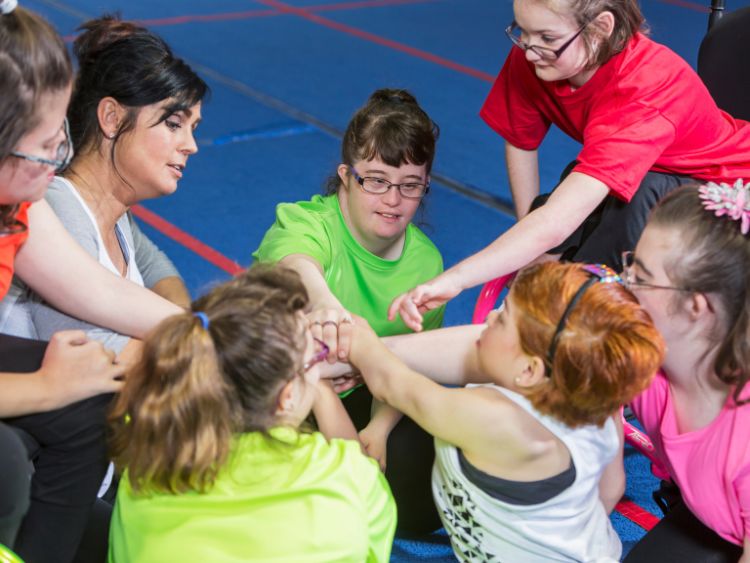Hey there, fitness enthusiasts and compassionate trainers! Have you ever pondered how you can extend your expertise to cater to a diverse range of abilities? In today’s fitness landscape, there’s a growing need for professionals who aren’t just fit but are also equipped to train individuals with various physical and cognitive challenges. That’s where adaptive personal training certification comes into the picture, a realm that’s not just about muscles and movements but also about understanding, empathy, and specialized knowledge. Let’s dive into this fascinating world and discover how you can be a part of this rewarding journey.
Elevate Your Training Expertise with Adaptive Personal Training Certification! 🌟
Are you passionate about making a difference in the lives of individuals with adaptive personal training certification special needs through fitness and nutrition? Join the ranks of over 1,500 trainers who have transformed their careers with our Certify Strong Online Adaptive Special Needs Certification. Whether you’re encountering rare diseases or common conditions like autism, our course equips you with the tools to design effective workout programs and master motivational techniques.
Why Adaptive Personal Training Certification Matters
Ever caught yourself wondering, “What’s the big deal about adaptive personal training certification?” Well, let me tell you, it’s a game-changer. This certification empowers trainers to work effectively with individuals who have special needs or disabilities. It’s not just about modifying exercises; it’s about understanding the unique challenges and potentials of each individual and crafting a program that’s as unique as they are. With such certification, trainers can make a genuine difference in people’s lives, enhancing not just physical strength but also boosting confidence and independence.
The Growing Demand for Adaptive Personal Trainers
- Rising Awareness: As awareness about inclusive fitness grows, so does the demand for qualified adaptive personal trainers.
- Diverse Clientele: From aging populations to individuals with disabilities, the client base is expanding rapidly.
- Recognition of Benefits: The physical and psychological benefits of tailored fitness programs are becoming widely recognized.
The Path to Certification
So, you’re pumped and ready to embark on this path? Fantastic! Here’s a rundown of what it typically involves:
- Basic Certification: First things first, you’ll need a general personal training certification.
- Specialized Courses: Next, dive into courses specifically focused on adaptive training.
- Hands-on Experience: Practical experience is key. Look for opportunities to work with diverse groups.
- Continuous Education: The learning never stops. Stay updated with the latest techniques and knowledge.
Key Skills and Knowledge Areas
- Understanding Disabilities: Knowledge of various disabilities and how they affect physical activity is crucial.
- Program Design: Crafting tailored exercise programs that cater to individual needs.
- Safety First: Ensuring safety and comfort during training sessions is paramount.
- Empathy and Communication: Being able to connect and communicate effectively with clients is as important as the training itself.
Adaptive Personal Training Certification: A Deep Dive
Alright, let’s get into the nitty-gritty of adaptive personal training certification. This certification isn’t just a piece of paper; it’s a testament to a trainer’s dedication and skill in providing inclusive and effective training.
Core Components of the Certification
- Assessment Techniques: Learning how to assess clients’ abilities and limitations.
- Adaptive Exercise Methods: Techniques for modifying exercises to suit various needs.
- Equipment Knowledge: Understanding and using adaptive equipment.
- Legal and Ethical Considerations: Being aware of legalities and ethical practices in training individuals with disabilities.
Real-Life Impact: Success Stories
Hearing about real people whose lives have been transformed by adaptive personal trainers is incredibly inspiring. These stories not only highlight the importance of this field but also demonstrate the profound impact a dedicated trainer can have.
How Trainers Have Made a Difference
- Case Studies: Sharing stories of individuals who have overcome challenges with the help of adaptive training.
- Testimonials: Featuring testimonials from clients and their families about the positive changes they’ve experienced.
FAQs
Q1: Do I need a background in healthcare to pursue this certification? A1: Not necessarily, but a basic understanding of human anatomy and physiology is helpful.
Q2: How long does it take to get certified? A2: It varies, but typically it can take several months to complete the necessary coursework and practical experience.
Q3: Is adaptive personal training certification recognized globally? A3: Recognition can vary, but many certifications are widely respected and acknowledged.
Conclusion
Embarking on a journey towards adaptive personal training certification isn’t just about expanding your professional skills; it’s about embracing a role that has the power to transform lives. This field opens up a world where fitness and empathy go hand in hand, where every training session is a step towards inclusivity and empowerment. So, are you ready to be a part of this fulfilling journey? Remember, it’s not just about training; it’s about making a real difference, one individual at a time. Let’s get moving!

